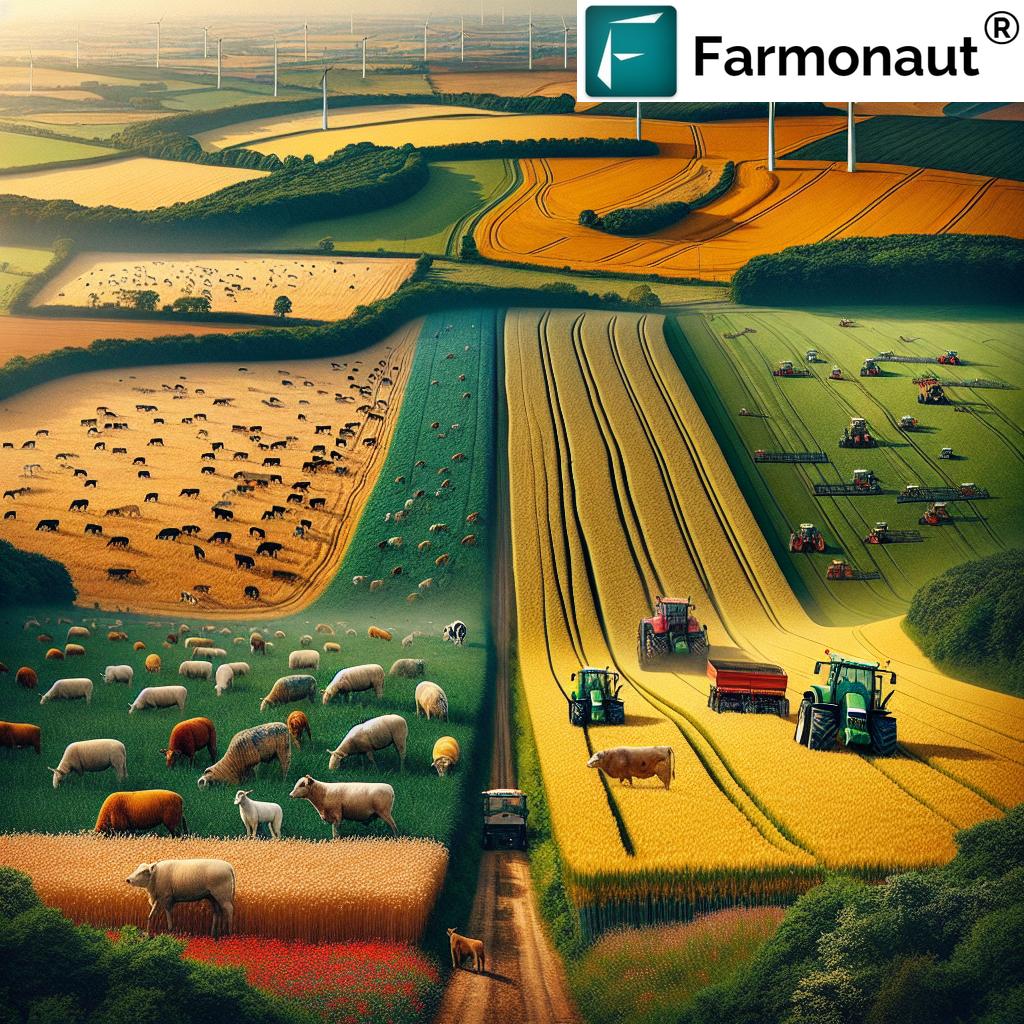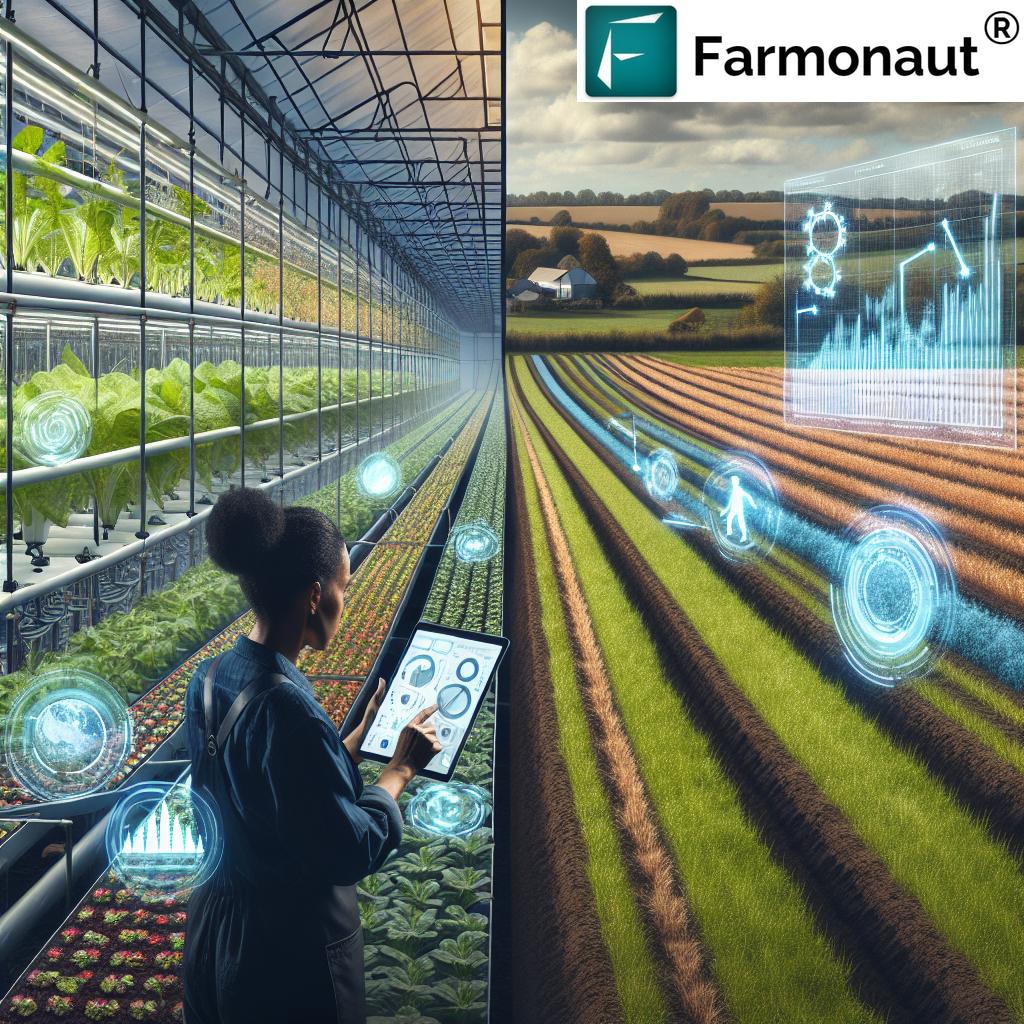Balancing Food Production and Land Use: England’s Sustainable Agriculture Framework for Future Food Security
“England’s House of Lords report emphasizes balancing food production with sustainability across 70% of the country’s land used for agriculture.”
In today’s rapidly changing world, the challenge of balancing food production with sustainable land use has become a critical issue, particularly in England. As we navigate the complexities of modern agriculture, we find ourselves at a crossroads where traditional farming practices meet innovative technologies and environmental concerns. This blog post delves into the recent House of Lords report on England’s farming future, exploring the intricate balance between food security and sustainable land management.
The Urgency of Sustainable Land Use in Agriculture
Sustainable land use in agriculture has emerged as a pivotal concern in recent years. With the global population continuing to grow and climate change posing unprecedented challenges, the way we utilize our agricultural land has never been more important. In England, where approximately 70% of the land is dedicated to farming, the need for a balanced approach is particularly acute.
The House of Lords report highlights several key aspects of this challenge:
- Balancing food production with environmental conservation
- Addressing the impacts of climate change on farming practices
- Ensuring the long-term viability of rural economies
- Maintaining traditional landscapes while meeting modern demands
As we explore these issues, it’s crucial to understand that the solutions lie not just in policy changes, but in the adoption of innovative technologies and practices that can revolutionize how we approach farming.
The Role of Technology in Sustainable Agriculture
In the quest for sustainable land use and enhanced food security, technology plays a pivotal role. Innovative solutions like those offered by Farmonaut are transforming the agricultural landscape. By leveraging satellite imagery and artificial intelligence, farmers can now make more informed decisions about crop management, resource allocation, and environmental impact.
Some key technological advancements include:
- Satellite-based crop health monitoring
- AI-driven advisory systems for personalized farm management
- Blockchain-based traceability for supply chain transparency
- Precision agriculture techniques for optimal resource use
These technologies not only improve productivity but also contribute to more sustainable farming practices, aligning perfectly with the goals outlined in the House of Lords report.
Explore Farmonaut’s innovative agricultural solutions:
Food Security Challenges in England
The House of Lords report underscores the pressing food security challenges facing England. As a nation with a rich agricultural heritage, England must navigate a complex landscape of competing priorities:
- Increasing food production to meet growing demand
- Reducing reliance on food imports
- Adapting to changing climate conditions
- Maintaining biodiversity and ecosystem health
These challenges are interconnected and require a holistic approach to agricultural land management. The report emphasizes the need for policies that support both productivity and sustainability, recognizing that these goals are not mutually exclusive but rather complementary.

Agricultural Land Management: Balancing Act
Effective agricultural land management is at the heart of addressing England’s food security and sustainability goals. The House of Lords report calls for a nuanced approach that considers various factors:
- Soil health and conservation
- Water resource management
- Biodiversity preservation
- Carbon sequestration potential
By adopting sustainable farming practices, farmers can improve soil fertility, reduce erosion, and enhance the overall resilience of their land. This not only benefits the environment but also ensures long-term productivity and profitability.
Farm Policy and Planning: A Collaborative Approach
One of the key recommendations from the House of Lords report is the need for a collaborative approach to farm policy and planning. This involves:
- Engaging farmers in land use planning discussions
- Incorporating local knowledge and expertise
- Developing flexible policies that can adapt to regional differences
- Providing incentives for sustainable practices
By involving farmers in the decision-making process, policymakers can ensure that agricultural policies are both practical and effective. This participatory approach also helps to build trust and cooperation between farmers, government agencies, and environmental organizations.
For farmers looking to leverage technology in their planning:
Climate Change Impact on Farming in England
“The UK government aims to achieve net-zero emissions in agriculture by 2050, requiring significant changes in land use and farming practices.”
The impact of climate change on farming in England cannot be overstated. The House of Lords report acknowledges the significant challenges that farmers face due to changing weather patterns, increased frequency of extreme events, and shifts in growing seasons. These impacts include:
- Changes in crop suitability and yields
- Increased risk of pests and diseases
- Water scarcity and flooding issues
- Soil degradation and erosion
To address these challenges, the report emphasizes the need for adaptive strategies and innovative technologies. Precision agriculture tools, like those offered by Farmonaut, can play a crucial role in helping farmers monitor and respond to changing conditions in real-time.
Rural Economy and Agriculture: A Symbiotic Relationship
The House of Lords report recognizes the vital role that agriculture plays in supporting England’s rural economy. As we strive for a balance between food production and sustainable land use, it’s crucial to consider the economic implications for rural communities. Key aspects include:
- Job creation and retention in agricultural sectors
- Diversification of rural businesses
- Support for local food systems and markets
- Investment in rural infrastructure and technology
By fostering a thriving agricultural sector, we can ensure the long-term viability of rural economies while also meeting our food security and sustainability goals.
Explore Farmonaut’s API for agricultural data integration:
Land Use Framework for Farmers: A Roadmap to Sustainability
The development of a comprehensive land use framework is central to the recommendations of the House of Lords report. This framework aims to provide farmers with clear guidance on how to balance productive agriculture with environmental stewardship. Key elements of this framework include:
- Zoning guidelines for different agricultural activities
- Best practices for soil and water conservation
- Strategies for integrating renewable energy production
- Incentives for adopting sustainable farming methods
By providing a clear roadmap, this framework empowers farmers to make informed decisions about land use while contributing to broader sustainability goals.

Food Production Priorities: Ensuring Food Security
While the House of Lords report emphasizes sustainability, it also underscores the critical importance of maintaining and enhancing food production. England’s food production priorities include:
- Increasing yields through sustainable intensification
- Reducing food waste across the supply chain
- Promoting crop diversification for resilience
- Supporting local food production and short supply chains
These priorities aim to ensure that England can meet its food needs while minimizing environmental impact and supporting local economies.
Sustainable Farming Practices: The Future of Agriculture
The adoption of sustainable farming practices is crucial for achieving the balance between food production and land conservation. The House of Lords report highlights several key practices:
- Conservation tillage and no-till farming
- Integrated pest management
- Precision fertilizer application
- Crop rotation and intercropping
- Agroforestry and silvopasture systems
These practices not only reduce environmental impact but also often lead to improved soil health, water retention, and long-term productivity. Technologies like Farmonaut’s satellite-based monitoring can help farmers implement and optimize these practices effectively.
For iOS users, explore Farmonaut’s mobile solutions:
Agricultural Adaptation Strategies: Preparing for the Future
As climate change continues to impact farming, the need for robust adaptation strategies becomes increasingly important. The House of Lords report emphasizes several key areas for adaptation:
- Development of climate-resilient crop varieties
- Implementation of efficient irrigation systems
- Adoption of smart farming technologies
- Creation of climate risk management plans
These strategies aim to enhance the resilience of England’s agricultural sector, ensuring its ability to withstand and adapt to changing environmental conditions.
Land Use Comparison Matrix
| Land Use Approach | Food Production Potential | Environmental Impact | Economic Viability | Climate Resilience |
|---|---|---|---|---|
| Traditional Farming | High | Medium-High | Medium | Low |
| Precision Agriculture | High | Low-Medium | High | High |
| Agroforestry | Medium | Low | Medium-High | High |
| Urban Farming | Low-Medium | Low | Medium | Medium-High |
The Role of Technology in Sustainable Agriculture
As we look to the future of farming in England, technology will play an increasingly important role in achieving sustainability goals. Companies like Farmonaut are at the forefront of this agricultural revolution, offering innovative solutions that can help farmers:
- Monitor crop health in real-time using satellite imagery
- Optimize resource use through AI-driven insights
- Implement precision farming techniques for improved efficiency
- Track and reduce carbon footprints
By leveraging these technologies, farmers can make more informed decisions, reduce waste, and increase productivity while minimizing environmental impact.
Explore Farmonaut’s API documentation for developers:
Conclusion: A Balanced Approach for England’s Agricultural Future
The House of Lords report on England’s farming future presents a clear vision for a balanced approach to land use and food production. By prioritizing sustainability without compromising food security, England can create a resilient and productive agricultural sector that meets the needs of both people and the planet.
As we move forward, it’s crucial that farmers, policymakers, and technology providers work together to implement the recommendations outlined in the report. By embracing sustainable practices, leveraging innovative technologies, and adapting to changing conditions, England’s agricultural sector can thrive in the face of future challenges.
The path to a sustainable agricultural future is not without its obstacles, but with collaborative efforts and the right tools at our disposal, we can create a farming landscape that is both productive and environmentally responsible. As we continue to balance food production with land use considerations, we pave the way for a more secure and sustainable future for generations to come.
FAQ Section
Q1: What are the main challenges facing England’s agricultural sector according to the House of Lords report?
A1: The main challenges include balancing food production with environmental conservation, addressing climate change impacts, ensuring rural economic viability, and maintaining traditional landscapes while meeting modern demands.
Q2: How can technology contribute to sustainable agriculture in England?
A2: Technology can contribute through satellite-based crop monitoring, AI-driven farm management systems, precision agriculture techniques, and blockchain-based supply chain transparency, all of which can improve efficiency and reduce environmental impact.
Q3: What are some sustainable farming practices recommended in the report?
A3: Recommended practices include conservation tillage, integrated pest management, precision fertilizer application, crop rotation, and agroforestry systems.
Q4: How does the report suggest involving farmers in land use planning?
A4: The report recommends engaging farmers in land use planning discussions, incorporating local knowledge, developing flexible policies, and providing incentives for sustainable practices.
Q5: What is the UK government’s target for emissions in agriculture?
A5: The UK government aims to achieve net-zero emissions in agriculture by 2050, which will require significant changes in land use and farming practices.






